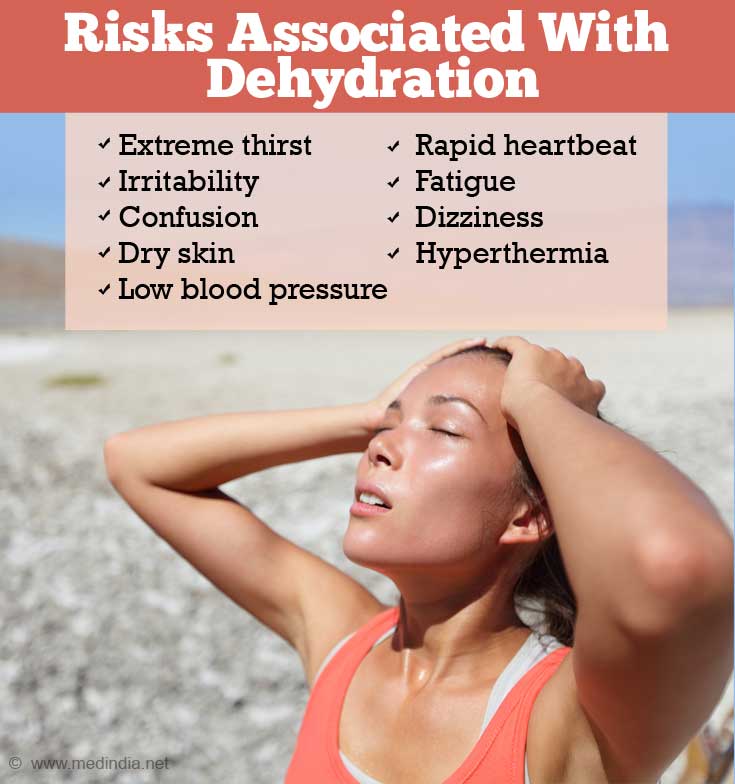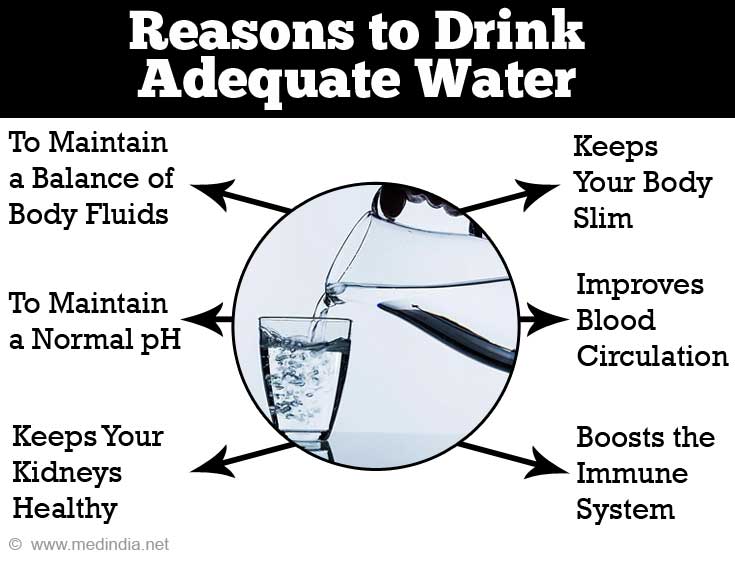- 15 Reasons Why You Need To Drink More Water - (https://www.organics.org/15-reasons-why-you-need-to-drink-more-water/)
- How Much Water Is Needed to Stay Hydrated? - (https://www.bestfoodfacts.org/water_needed_hydration/)
- 16 Impressive Benefits of Drinking Water - (https://www.betterhealth.vic.gov.au/health/healthyliving/water-a-vital-nutrient)
- Water – a vital nutrient - (https://www.organicfacts.net/health- benefits/other/health-benefits-of-drinking-water.html)
- Health Benefits of Water: Real or Overhyped? - (http://www.stayinghealthy.org/health-benefits-of-water/)
Why Water Matters? Importance of Drinking Water
Water is the essence of life. About 70 percent or two-thirds of our body weight is made up of water. Our blood contains (83%); muscles (76%), brain (80%), lungs (79%) and bones (20%) contain this vital element water, which is essential for the smooth functioning of all bodily functions.
You need to drink water to replace the normal fluid loss from urine, sweating, stools and breathing. The loss of fluid is accentuated during exercise, illness and in a warm climate. If your water intake does not match the output, then you will be dehydrated. Also since water has no fat, sugar, calories or carbohydrate, it is an ideal choice to replenish the loss of body fluids.
It is very important to drink enough water to regulate the body temperature, transport nutrients to each and every cell in the body, digest food, and flush out toxins from the body. It also helps to regulate the internal body temperature by sweating and respiration. It acts as a shock absorber for the brain, spinal cord and fetus. Water keeps the tissues in the body hydrated and the skin soft and supple.
Insufficient intake of water or increased loss of water from the body may cause giddiness, kidney disease, electrolyte imbalance, anemia, increased cholesterol, constipation and even mental confusion.
What is the Recommended Water Intake Per Day?
It is recommended that eight glasses is the minimum water intake for an adult human being.
These recommendations cover fluid intake from water, other beverages and food. If you are not sure about your hydration level, look at your urine. If it 's clear, your body is adequately hydrated. If it 's dark yellow with a strong odor, you are probably dehydrated.
In 2004, the first official recommendation about water intake was made. According to the Institute of Medicine, the required water intake for adult men and women is 3.7 and 2.7 liters per day.
However, if you engage in vigorous exercise, sweat in high heat, or come down with a fever, or contract an illness that causes vomiting or diarrhea, suffer from diabetes, the water loss is increased and it is important to increase your fluid intake to restore the body 's natural hydration levels. Around 80% of the total daily water should be obtained from beverages such as water, juices, milk, tea, coffee and the remaining 20% from food sources.
What Will Happen if You’re Dehydrated?
If you lose water in your body without replacing it, the result is dehydration. Mild dehydration can easily be treated but, if it reaches extreme levels, it can be life-threatening and will require immediate medical attention.
At a cellular level, shrinkage of cells occurs as water is borrowed from the cells to maintain other vital components such as the blood. The brain triggers an increased sensation of thirst. In severe dehydration, you may experience extreme thirst, irritability and confusion, sunken eyes, dry skin, low blood pressure, rapid breathing, dark urine, rapid heartbeat, fever and unconsciousness. Infants are more vulnerable to dehydration.

If your body loses one to two percent of its entire water content, you will feel thirsty, dryness in the mouth, reduced quantity of urine, fatigue, muscle cramps and you may develop a mild headache and dizziness. Research shows that 1% dehydration affects your mood, attention, memory and motor coordination. The fluid in the brain tissues reduces with dehydration, thus reducing brain volume and temporarily affecting cell function.
As your body water becomes less, your blood becomes more concentrated which triggers your kidneys to retain water and this results in less urine.
The thicker your blood becomes, the heart has to work harder to pump the blood to maintain the blood pressure. At this stage, if more strain is put on your dehydrated body such as when exercising or excessive heat, you may faint or collapse.
Less water also hampers your body’s attempts at regulating temperature, which can result in higher body temperatures than normal (hyperthermia).
Why Do You Need to Drink Enough Water Every Day?
- To Maintain a Balance of Body Fluids - Water is the carrier of oxygen, nutrients, and hormones to all parts of the body and also provides a medium for the removal of toxins, dead cells, and waste material. The posterior pituitary secretes the antidiuretic hormone, which regulates how much water should be excreted as urine. When the levels of water in the body are low, the brain triggers a thirst mechanism which is a signal to drink a glass of water, juice or other fluids.
- To Maintain a Normal pH- Human body maintains a pH range of 7.35-7.45. An acidic shift may lead to sickness and an inability of the body to assimilate essential nutrients. A normal pH range is attainable by consuming lots of water.
- Keeps Your Kidneys Healthy - When your fluid intake is adequate, urine is light in color and has minimal odor. But when your fluid intake is reduced, the urine is concentrated and becomes dark yellow with a strong odor. The kidneys play an important role in removing toxins from the body. Decreased water intake results in the accumulation of waste toxins such as blood urea nitrogen. You may also be at risk of developing kidney stones, if you habitually drink less water. Water is a good solvent and does not allow the minerals and salts to accumulate to form stones and eliminates the salts in the urine.
- Keeps Your Body Slim- A decrease in water intake causes fat deposits to increase, while an increase in water intake helps to reduce fat deposits. Water suppresses the appetite naturally and helps the body metabolize stored fat. Also in many people, the thirst mechanism is so weak it is often mistaken for hunger. According to a study conducted at the University of Washington, one glass of water shut down hunger pangs of almost 100 percent of dieters. Food with high water content such as fruits and vegetables help you feel full for a longer period. Water-rich foods such as fruits, vegetables, leafy greens fill you up faster, and hydrates the body.
- Improves Your Skin- Drinking adequate water plumps up the skin and acts as a protective barrier to prevent excess fluid loss, giving the skin a youthful appearance. Lack of hydration makes your skin flaky, dry and wrinkled.
- Boosts the Immune System- When a bacterium, virus or any foreign particle enters the body, specialized cells such as white blood cells and lymphocytes attack them and help to ward off disease. These cells can function at optimum levels only when the body is well-hydrated.
- Helps Maintain Normal Bowel Function- Adequate fluid and fiber are necessary to keep your bowel functioning properly. Water helps remove toxins from the body especially from the digestive tract. When there is not enough fluid in the tissues, the large intestine pulls water from stools resulting in constipation.
- Prevents Muscle Fatigue- A low fluid and electrolyte level in the muscle cells may result in muscle fatigue. American College of Sports Medicine recommends that you drink 17 ounces (500 ml)of fluid two hours before exercise. During exercise you should drink fluids at regular intervals to replace the fluids lost by sweating.
- Improves Blood Circulation- Water is essential for proper blood circulation within the body. Water maintains the proper viscosity of blood and plasma and the increased oxygen levels provide you with greater energy. Water can prevent cardiovascular disorders to a large extent.







